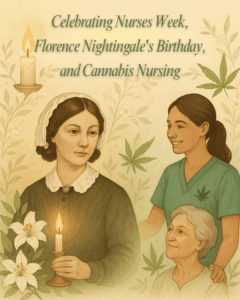Happy October and Happy Autumn!
Each month I enjoy educating our audience on how to bring balance to the endocannabinoid system, and no one needs that more than women, especially those approaching menopause. Unlike many ailments, all women will experience changes to their bodies with aging, with some more affected than others. Menopause brings pros and cons; greater wisdom, more time to chill, rich lifelong friendships…hot flashes, headaches, insomnia, mood changes, lower energy, weight gain, and genitourinary issues. Reproductive changes and these other symptoms may last 7-10 years, and many women are looking for help.
Traditional therapies including estrogen, progesterone, or combination hormone replacement can improve hot flashes, sleep, and osteoporosis, but carry their own risks of increased breast cancer risk, weight gain, and cardiovascular disease. Supplements such as Black Cohosh, Kava, St. John’s Wort, can help with hot flashes, sleep, and mood instability, but may cause liver issues, GI upset, and RX interactions. All options should be discussed with a provider who can guide each treatment individually. Increasing dietary soy, calcium, magnesium, fruits, and vegetables all help balance symptoms, and lowering sodium reduces water retention. Exercise has universal benefits and walking 30 minutes a day will help with energy, stamina, and stress.
Do cannabinoids help with women’s issues like menopause or even breast cancer? The answer is yes, but it’s complicated and individualized. A recent survey reported by the Today Show that was done by the North American Menopause Society found that 27% of women in menopause reported using cannabis, whereas only 19% said they were using traditional hormone replacement. 75% said cannabis was helpful to managing symptoms. Over 50% said they got no guidance and tried to figure out these novel cannabis products on their own. To help break it down for our audience, let’s review the evidence.
Hot flashes or vasomotor symptoms are one of the most troublesome issues causing night sweats and insomnia. THC can lower body temperature and can be sedating enough to help initiate and maintain sleep. THC reduces REM and increases deep sleep which can lessen many symptoms of imbalance so that the body repairs and restores. Indica strains with 20% or lower THC would be ideal to vape before bed. Higher potency THC will be too stimulating and may be too strong resulting in morning grogginess. An Indica tincture or edible of 5-10mgs taken an hour before desired sleep time can also usher in better, more predictable sleep.
Headaches and migraines are thought to be caused by an endocannabinoid deficiency, and when environmental triggers cause imbalances, the deficient ECS cannot correct the errors. Supplementing with routine dosing of CBD may help reduce the frequency and severity of these headaches. Pain, in general, can be reduced with the anti-inflammatory benefits of CBD and CBG, providing analgesia and increased energy and focus for the day.
The moodiness that many women experience in menopause may be relieved by the anti-anxiety and anti-depressant effects of cannabinoids. Routine dosing of a CBD tincture can activate 5-HT in the body, helping to produce Serotonin which naturally calms nerves and lifts mood. Pairing cannabinoids with therapeutic counseling can help a woman see her aging in a positive light with laughter and acceptance instead of fighting the process. THC activates CB1 which may lift mood and even strengthen memory as menopause fades cognitive abilities.
Cannabinoids may help reduce reliance on pharmaceuticals, especially as women fear the increased risks of breast cancer and cardiovascular disease from HRT. Though most doctors say the benefits of HRT outweigh the risks, the study cited shows that women want natural options that allow them to self-direct their care and personalize their options. Of the women in the NAMS study reported, three-quarters of those surveyed said their symptoms were not treated by traditional options, so these options are necessary.
For those who are treating menopause and breast cancer, it is even more important to broaden the conversation to include cannabinoids as natural options. Cannabinoids may provide antiproliferative properties and even reduce chemotherapy-induced neuropathies in the hands or feet, helping many continue to tolerate their treatments. Lessening nausea and vomiting is done with the same combinations, adding micro doses of THC as needed for pain and sleep.
A detailed assessment, education, and multi-modal treatment plan can be developed by our cross-trained nurses and coaches. Holistic Caring is the one-stop-shop for knowledge, support, and step-by-step guidance through menopause and any other life adjustment. We are all here to learn and to love, and by accepting help through our journey we can get back to thriving.
If you’re in need of better solutions to brighten your days and quiet your nights, let us know!
Book an appointment with one of our Green Nurses through the Holistic Caring Network.









